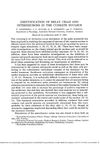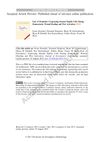 291 citations,
April 2010 in “Gastroenterology”
291 citations,
April 2010 in “Gastroenterology” Certain proteins, Lgr5 and Lgr6, are important markers of adult stem cells and are involved in tissue repair and cancer development.
 201 citations,
November 1964 in “Journal of neurophysiology”
201 citations,
November 1964 in “Journal of neurophysiology” The cuneate nucleus has two main neuron types: relay neurons and interneurons.
 150 citations,
December 2012 in “EMBO Reports”
150 citations,
December 2012 in “EMBO Reports” Stem cell self-renewal is complex and needs more research for full understanding.
 106 citations,
March 2014 in “BioEssays”
106 citations,
March 2014 in “BioEssays” We need more research to better understand human hair follicle stem cells for improved treatments for hair loss and skin cancer.
 88 citations,
February 2011 in “Journal of Dermatological Science”
88 citations,
February 2011 in “Journal of Dermatological Science” Minoxidil helps hair growth by activating the β-catenin pathway.
 77 citations,
February 2017 in “Stem Cell Reports”
77 citations,
February 2017 in “Stem Cell Reports” SHISA6 helps maintain certain stem cells in mouse testes by blocking signals that would otherwise cause them to differentiate.
 66 citations,
July 2007 in “Journal of Molecular Medicine”
66 citations,
July 2007 in “Journal of Molecular Medicine” Stress increases certain chemicals in the skin and nerves, which might worsen skin conditions.
 62 citations,
December 2013 in “Aaps Journal”
62 citations,
December 2013 in “Aaps Journal” Squarticles effectively deliver hair growth drugs to follicles and dermal papilla cells.
 45 citations,
May 2018 in “Stem Cell Research & Therapy”
45 citations,
May 2018 in “Stem Cell Research & Therapy” Using patients' own fat-derived cells to treat alopecia areata significantly improved hair growth and was safe.
 33 citations,
December 2015 in “Neuroendocrinology”
33 citations,
December 2015 in “Neuroendocrinology” Finasteride treatment changes brain steroid levels and receptors, affecting brain function even after stopping treatment.
 32 citations,
February 2019 in “Journal of neurochemistry”
32 citations,
February 2019 in “Journal of neurochemistry” Sex hormones affect brain injury differently in males and females.
 32 citations,
August 2015 in “Journal of Investigative Dermatology”
32 citations,
August 2015 in “Journal of Investigative Dermatology” Prominin-1 expressing cells in the dermal papilla help regulate hair follicle size and communication but don't aid in skin repair.
 28 citations,
December 2012 in “The American Journal of Cosmetic Surgery”
28 citations,
December 2012 in “The American Journal of Cosmetic Surgery” Proteins from stem cells improved hair growth in patients with hair loss.
 26 citations,
October 2016 in “Biomolecules & Therapeutics”
26 citations,
October 2016 in “Biomolecules & Therapeutics” 3-Deoxysappanchalcone helps human hair cells grow and stimulates hair growth in mice by affecting certain cell signaling pathways.
 25 citations,
April 2012 in “Acta Biomaterialia”
25 citations,
April 2012 in “Acta Biomaterialia” Using certain small proteins with a growth factor and specific materials can increase the creation of neurons from stem cells.
 22 citations,
December 2014 in “Naunyn-Schmiedeberg's Archives of Pharmacology”
22 citations,
December 2014 in “Naunyn-Schmiedeberg's Archives of Pharmacology” Baicalin helps hair grow by boosting certain cell activities and speeding up hair cycle in mice.
 21 citations,
January 2019 in “Elsevier eBooks”
21 citations,
January 2019 in “Elsevier eBooks” Green-synthesized nanoparticles can effectively target cancer cells, reducing side effects and improving treatment.
 17 citations,
November 2014 in “American Journal of Physiology-gastrointestinal and Liver Physiology”
17 citations,
November 2014 in “American Journal of Physiology-gastrointestinal and Liver Physiology” Finasteride helps brain function in rats with liver-related brain issues.
 16 citations,
October 2019 in “Biological & Pharmaceutical Bulletin”
16 citations,
October 2019 in “Biological & Pharmaceutical Bulletin” Houttuynia cordata extract may help hair grow by improving cell survival and increasing cell growth.
 15 citations,
May 2020 in “BMC complementary medicine and therapies”
15 citations,
May 2020 in “BMC complementary medicine and therapies” Polygonum multiflorum extract helps hair grow longer and fights the effects of hormones that cause hair loss.
 14 citations,
March 2018 in “Translational Stroke Research”
14 citations,
March 2018 in “Translational Stroke Research” Finasteride helps protect brain in old male rats.
 14 citations,
November 2007 in “Journal of Dermatological Science”
14 citations,
November 2007 in “Journal of Dermatological Science” Vitamin C derivative may promote hair growth by activating specific genes.
 13 citations,
December 2017 in “CNS Neuroscience & Therapeutics”
13 citations,
December 2017 in “CNS Neuroscience & Therapeutics” Finasteride affects young male rats' brain function and behavior negatively.
 13 citations,
November 2010 in “Experimental Dermatology”
13 citations,
November 2010 in “Experimental Dermatology” Vitamin C derivative reduces hair loss-related protein in cells.
 11 citations,
August 2020 in “Diabetes”
11 citations,
August 2020 in “Diabetes” Testosterone helps human pancreatic cells increase insulin release.
 11 citations,
August 2015 in “PLOS ONE”
11 citations,
August 2015 in “PLOS ONE” Finasteride affects brain stress and enzyme activity differently in various regions, possibly helping with liver-related brain issues.
 9 citations,
June 2020 in “BMC Molecular and Cell Biology”
9 citations,
June 2020 in “BMC Molecular and Cell Biology” Stress hormone CRF can cause hair loss by affecting hair growth cells and hormones.
 9 citations,
November 2019 in “Scientific reports”
9 citations,
November 2019 in “Scientific reports” The AC 2 peptide from Trapa japonica fruit helps protect hair cells and may treat hair loss.
 8 citations,
August 2016 in “Journal of pathology and translational medicine”
8 citations,
August 2016 in “Journal of pathology and translational medicine” CD99 is highly present in certain skin cells and could help treat skin conditions.
 2 citations,
August 2019 in “BMC Complementary and Alternative Medicine”
2 citations,
August 2019 in “BMC Complementary and Alternative Medicine” Asiasari radix extract may be a potential treatment for melanoma because it selectively triggers cell death in melanoma cells by affecting p53 regulation.






























